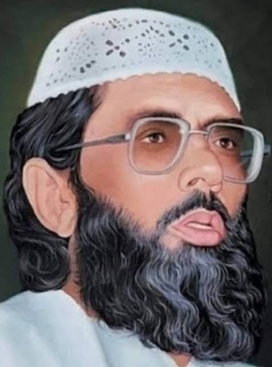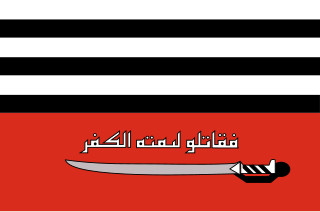
The Deobandi movement or Deobandism is a revivalist movement within Sunni Islam that adheres to the Hanafi school of law. It formed in the late 19th century around the Darul Uloom Madrassa in Deoband, India, from which the name derives, by Muhammad Qasim Nanautavi, Rashid Ahmad Gangohi, and several others, after the Indian Rebellion of 1857–58. They opposed influence of non-Muslim cultures on the Muslim of South Asia. The movement pioneered education in religious sciences through the Dars-i-Nizami associated with the Lucknow-based ulama of Firangi Mahal with the goal of preserving traditional Islamic teachings from the influx of modernist, secular ideas during British colonial rule. The Deobandi movement's Indian clerical wing, Jamiat Ulema-e-Hind, was founded in 1919 and played a major role in the Indian independence movement through its participation in the Pan-Islamist Khilafat movement and propagation of the doctrine of composite nationalism.

Azam Tariq was a Pakistani politician and cleric who was the leader of Sipah-e-Sahaba Pakistan (SSP), a Sunni Islamist organization, which was officially banned by the government of Pakistan in August 2001.

Tehreek-e-Jafaria Pakistan, formerly Tehreek Nifaz Fiqah-e-Jafaria Arif Hussaini/Sajid Naqvi Group was the Shia political party in Pakistan from 1979 to 2000. Belonging to the Ja'fari school of Islamic jurisprudence, TNFJ was founded in 1979 by Syed Arif Hussain Al Hussaini supported by Grand Ayatollah Muhammad Hussain Najafi Dhaku. Its creation coincided with the enforcement of controversial Islamic laws by then President of Pakistan, General Mohammad Zia-ul-Haq. At the same time, 1979 Iranian Revolution in Shi'a Iran added extra confidence and comfort in the movement.

Jhang is the capital city of Jhang District in the central portion of the province of Punjab, Pakistan. Situated on the east bank of the Chenab river, it is the 18th largest city of Pakistan by population.
Sectarian violence in Pakistan refers to violence directed against people and places in Pakistan motivated by antagonism toward the target's religious sect. As many as 4,000 Shia are estimated to have been killed in sectarian attacks in Pakistan between 1987 and 2007, and thousands more Shia have been killed by Salafi extremists from 2008 to 2014, according to Human Rights Watch (HRW). Sunni Sufis and Barelvis have also suffered from some sectarian violence, with attacks on religious shrines killing hundreds of worshippers, and some Deobandi leaders assassinated. Pakistan minority religious groups, including Hindus, Ahmadis, and Christians, have "faced unprecedented insecurity and persecution" in at least two recent years, according to Human Rights Watch. One significant aspect of the attacks in Pakistan is that militants often target their victims places of worship during prayers or religious services in order to maximize fatalities and to "emphasize the religious dimensions of their attack".

Haq Nawaz Jhangvi was a Pakistani cleric who founded the Sipah-e-Sahaba Pakistan, a Sunni Deobandi group known for its anti-Shia thoughts, on 6 September 1986.
Riaz Basra was a Pakistani militant leader and founder of the militant organization Lashkar-e-Jhangvi, which he founded alongside Malik Ishaq and Akram Lahori, in 1996.

Sipah-e-Muhammad Pakistan (S.M.P) was a Shia organisation and a former political party in Pakistan that was formed in 1993 by Allama Mureed Abbas Yazdani and now after his shahdat and long period of time again his nephew Malik Muhammad Wasi Ul Baqar is looking forward to take responsibility of running Sipah-e-Muhammad Pakistan

Syed Sajid Ali Naqvi is a Pakistani Shia Islamic scholar from Rawalpindi, Pakistan. He is the founder & leader of Islami Tehreek Pakistan also Patron-in-Chief of Shia Ulema Council. His main objective is to create an Islamic rule in the Pakistan.

The Lashkar-e-Jhangvi, is a Deobandi supremacist, terrorist and militant organisation based in Afghanistan. The organisation operates in Pakistan and Afghanistan and is an offshoot of anti-Shia party Sipah-e-Sahaba Pakistan (SSP). The LeJ was founded by former SSP activists Riaz Basra, Malik Ishaq, Akram Lahori, and Ghulam Rasool Shah.
Jamia Uloom-ul-Islamia is an Islamic University in Banoori Town, Karachi, Pakistan. The university continues the tradition of the Darul Uloom system initiated by Darul Uloom Deoband. As of 2007, there are about twelve thousand students in different departments of the Jamiah and its branches, including a number of foreign students from over sixty countries.
Sadeq Ganji was the Iranian Consul General to Pakistan, and director of the Iran-Pakistan Cultural Center.

Rana Sanaullah Khan is a Pakistani lawyer and politician who served as the 39th Interior Minister of Pakistan. He had been a member of the National Assembly of Pakistan from August 2018 till August 2023. He is a senior member of PML-N and the President of PML-N in Punjab province since 4 May 2019. Before getting elected to the National Assembly of Pakistan, Sanaullah had been elected to the Provincial Assembly of Punjab five times and had served in high-ranking ministries of the province.
The Difa-e-Pakistan Council is an umbrella coalition of more than 40 Pakistani Political and Religious parties that advocated conservative policies such as closing NATO supply routes to Afghanistan and rejects granting India most-favored nation status.

Malik Ishaq was a Pakistani militant, and leader and co-founder of the globally designated Lashkar-e-Jhangvi (LeJ).
Masroor Nawaz Jhangvi is a Pakistani Islamic cleric and politician who was a member of the Punjab Assembly from January 2017 to May 2018. He is a son of slain Sipah-e-Sahaba founder Haq Nawaz Jhangvi.
Muhammad Ahmad Ludhianvi is the current Sarparast-e-Aala of the Ahle Sunnat Wal Jama'at (ASWJ), a proscribed group in Pakistan. Ludhianvi became the head of ASWJ upon the death of the previous chief, Ali Sher Haidri, in a 2009 ambush. Ludhianvi is also the Secretary General of Difa-e-Pakistan Council (DPC).
Isar-ul-Haq Qasmi was a Pakistani Islamic cleric, preacher and a member of Sipah-e-Sahaba. He had been member of the National Assembly of Pakistan between 1990 and 1993 representing Jhang constituency.

Awrangzib Faruqi is a Pakistani religious leader who is the chief of the Karachi chapter of Ahle Sunnat Wal Jamaat (ASWJ), also known as the Sipah-e-Sahaba. Faruqi is taking part in the 2024 Pakistani general election on NA-230 on the ticket of Pakistan Rah-e-Haq Party.














